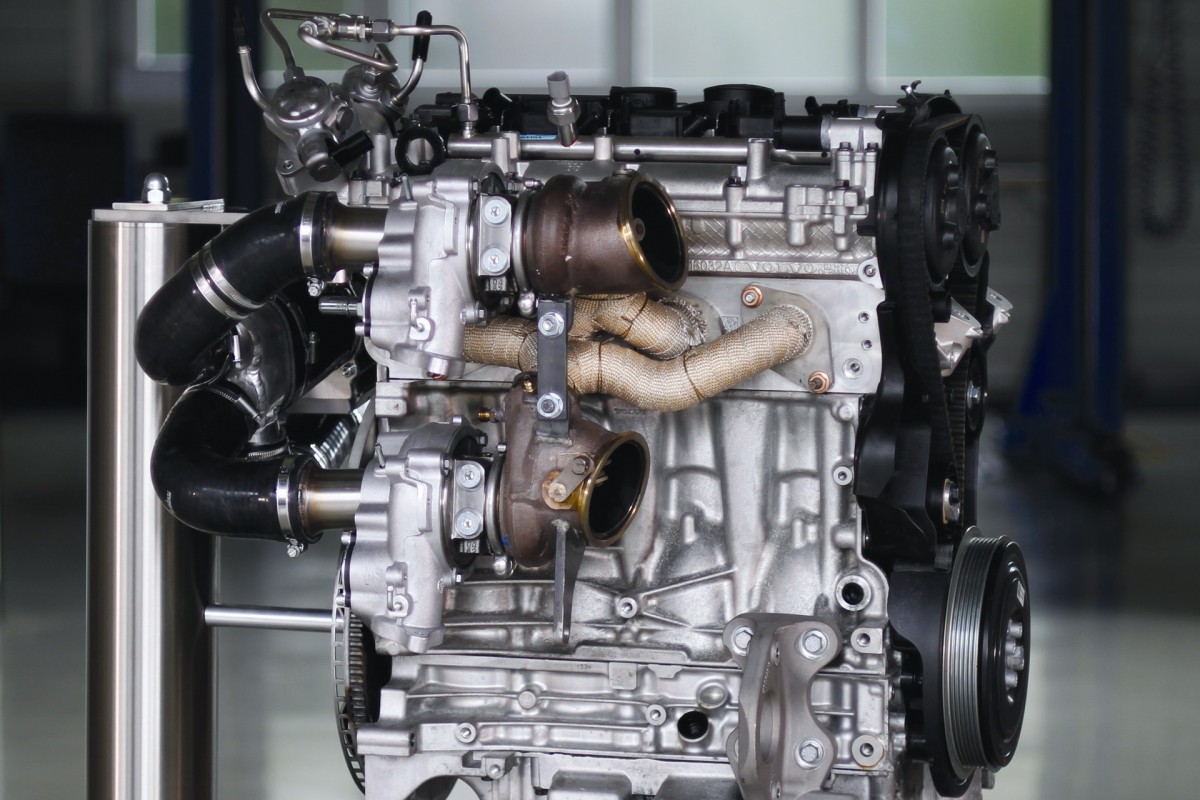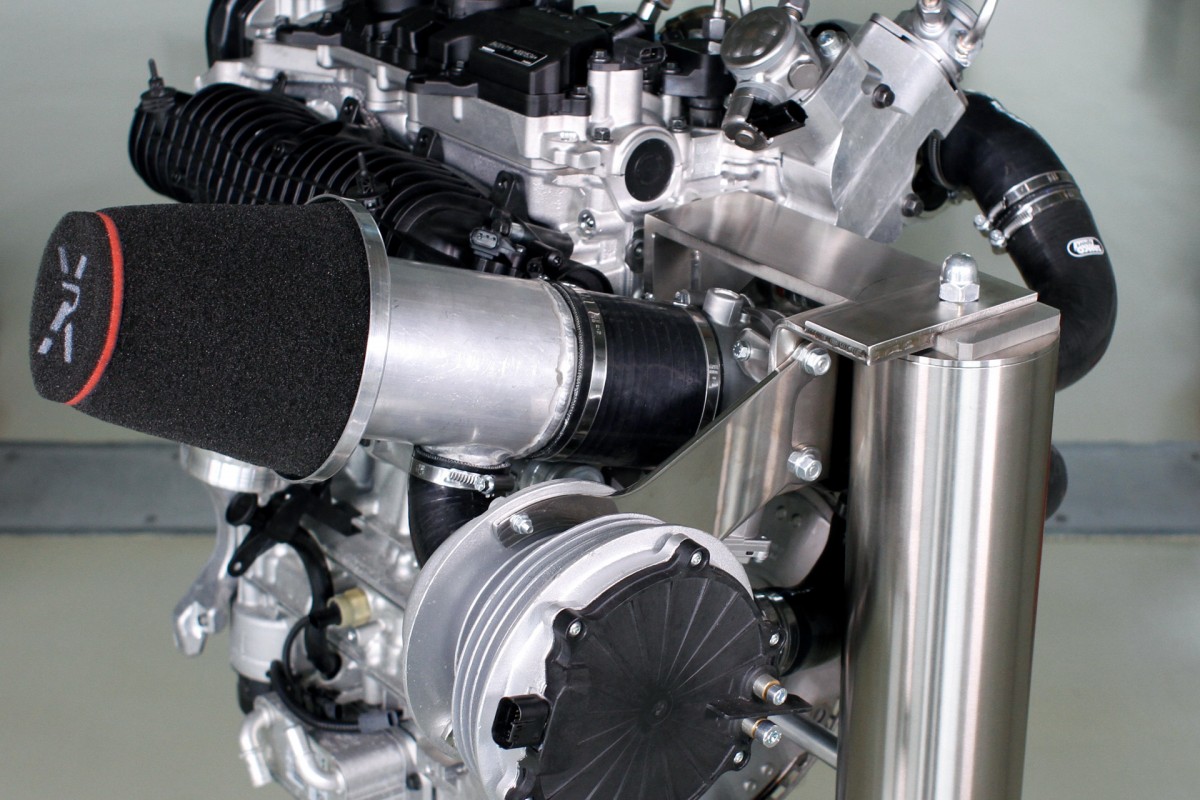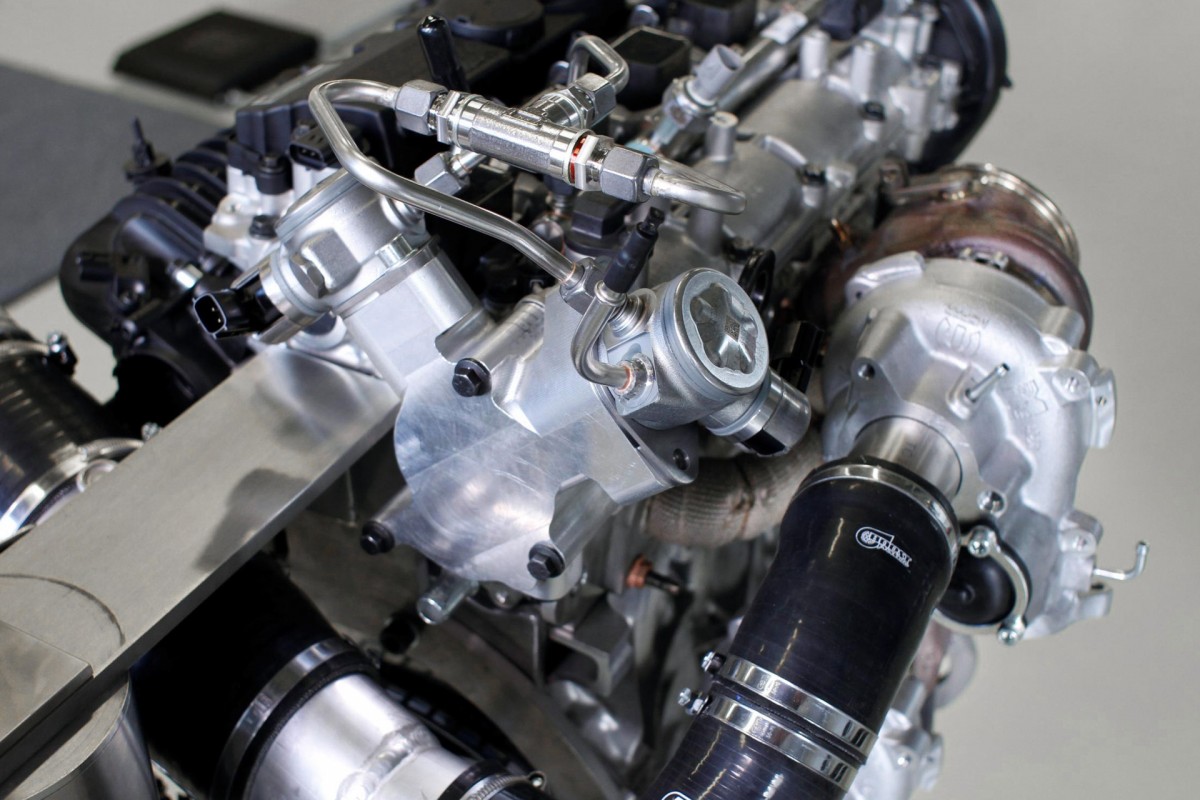
On paper, ever-tightening exhaust emission regulations and fuel efficiency standards seem like bad news for the future of performance motoring, but in reality it couldn’t be any further from the truth. When it comes to powertrain development, new thinking is bringing some exciting technologies to the table, and thanks in part to turbochargers, it’s leading to compact, highly efficient units that are big on output.
Swedish automaker Volvo was one of the first manufacturers to adopt turbocharging in its production car line-up. Its B21ET was a 2.1-litre four-cylinder engine with 7.5:1 compression and a Garrett T3 that powered the 1981 Volvo 240 Turbo, producing 155hp in road car form and 320hp in its latter Group A racing guise. Now, more than three decades on, Volvo has pulled the wraps off a new petrol 2.0-litre four-cylinder concept engine that features three turbochargers and makes 450hp…

The ‘High Performance Drive-E Powertrain Concept’ is the work of Volvo’s Powertrain Department, with assistance from its competition wing – Volvo Polestar Racing, Austrian engine development company AVL, and Denso in Japan.
As you can see from the main image at the top of the page, the design uses two conventional turbochargers in a parallel configuration. What you can’t really make out from the side angle is the third unit – seen at the bottom of the image – which unconventionally trades its turbine for an electric motor. Basically speaking, the electrically-driven turbo compressor force-feeds air into the mouths of the two exhaust-driven turbos, spinning the compressor wheels to create an initial surge of boost the moment the accelerator is stepped on. Then, once the revs are up, the two regular turbos take over and keep the boost flowing in the traditional manner. The result: all the power-making benefits of larger turbos, but none of the associated lag.

Complementing the triple turbo setup is a unique high pressure fuel delivery system designed by Denso. Managed by a Denso ECU, there are specifically designed pumps and injectors in the mix and a working pressure of 250bar (3,675psi)
Whether or not this engine configuration ever finds its way into a Volvo production car remains to be seen, but given the promising results here, you have to like where this sort of thinking is going!
Brad Lord
brad@speedhunters.com






Very cool!! 3675 psi fuel pressure! That's one mean firework!
one sexy beast, volvo for life. https://www.youtube.com/watch?v=cNzYty1gAZI check out the video of that engine!
I know a certain 240 that would be very happy with this.
Really would like to see this make it into production.
@jannevaam I sense a certain accent there
yet its still a timing belt? Why wouldn't they switch to a chain like everyone else?
I don't know if that "3rd turbocharger" should be called a turbo. Its closer to a super charger than a turbo...new class called Electro-chargers?
Any way I can get a background quality version of the cover image?
ScottBaker1 Concurred, I believe the electrically or belt driven wheels attached to compressor housings are termed superchargers now a days.
Still cool though, a compound - sequential super - turbo charger setup.
maxproof Cambridge?
Fuel efficiency? With turbocharged mini engines? Thanks no. How long should this last and how much does it consume at higher speed / more than manufacturer based norm. We don't do 80 kmh in sixth gear all day long... Guess I stay with V8 and R6 as long as I could..
Holy maintenance costs Batman!
bananos 450bhp at 2L means per 1 liter this engine pumps out 225bhp, for a LS2 (6L) to pump out 225bhp per liter would result in a total horsepower of 1350bhp. Lets say the V8 is turbocharged as well, your saying a turbocharged V8 pumping out 1325bhp can do better on fuel economy compare to a turbocharged inline 4? Oh and btw does your V8 uses 250bar of fuel line pressure?
ScottBaker1 I believe historically, both are superchargers, what we call turbos are actually 'turbosuperchargers'. As in, turbine-superchargers. But these are devices that were only popularized during world war 2 and they just made up names for them back then that we are stuck with today. It gets real weird with the semantics when you go back to those days. These days we have so many variations of superchargers and everyone calls "turbosuperchargers" "turbos" so at what point does everything just get renamed to what we call it now vs what we called it then? Plus we have turbine superchargers that are belt-driven, so I dont even raelly know anything beyond the naming semantics is more complicated than you might think.
njectors in the mix and a working pressure of 2,50bar (3,675psi)
WesleyCouture NVH probably, theres nothing inherently wrong with a timing belt.
Max123456
Direct injection engine, so 250 bar is correct.
KylePearson ScottBaker1 Or we could just call them what they are, air compressors?
LipHanTan bananos I reckon it'll be toned down for production - maybe to about 350-380. Anyway does the fuel pressure mean anything in terms of fuel economy and/or performance?
KylePearson ScottBaker1 Thanks James May lol. On a personal note I believe anything that compresses air powered by exhaust gasses to be a turbo and anything that compresses air through other means to give more instant response a supercharger. But you're right it can be a bit of a grey area.
Andrew Rogerson LipHanTan bananos yes it does. by increasing the pressure the fuel distribution is more homogeneous and the fuel drop size decreases both leading to increased combustion efficiency
so, it's like a compund-charging?
LipHanTan bananos 450 bhp NA V8 would be more economical than this 2 liter. Nobody is talking about 1325 bhp.
Andrew Rogerson oh yes defo, if you see the trend nowadays with downsizing it will be around 1.3, 1.6L.
@Steph Currry spot on.
XTad LipHanTan bananos To compare two different engine of two different capacity you compare it by output-per-liter. bananos was questioning this engine's fuel efficiency and how he favors a V8 (im guessing your classic SBC or BBC), so if you read back my comment to bananos hopefully you will understand why i say what i said. And back to you saying 450bhp NA V8 would be more economic, you didn't specify the displacement of your V8, so are you saying a (lets say) 6.2L NA V8 capable of 450bhp is more fuel economic?
Again, direct / indirect injection can be used on any engine with any displacement or any number of cylinder, if specifically your 5.7L LS1 will NOT have direct injection but the new 6.2L LT1 does have direct injection operating at at max of 150 bar. So depends on what your 'NA V8' refers to.
I say put it in the new s60R
perpetualroad.com
KylePearson ScottBaker1 just my 0.02 I commonly refer to non-exhaust driven turbine compressors as centrifugal superchargers.
XTad LipHanTan
Correct, was only referring to (good old) natural aspirated big displacements as they are not out of order. Therefore mentioned manufacturer-based specs of fuel efficiency which are not real. Everybody knows that an engine w/ little displacement and turbo(s) is consuming A LOT of fuel when pushed.
And no. We dont do 80km/h all day long in sixth gear to save fuel (said above already). There are some people doing this but a) arent they potential SH readers and b) wouldnt they buy a triple turbo 450hp engined car.
Would never buy an turbo-equipped car (as daily) as those parts never last as long as chassis & motor. Turbos are wear parts. But to get a low fleet consumption (on paper) manufacturers gave to do this..
Dont get me wrong, direction of industry getting more efficient is wonderful and reasonable.
But know one who HAD one of thses turbo+compressor - forced 1,4liter - Golfs, he told me what this modern and so called "efficient" car consumed on the Autobahn. This was very surprising for me even as I am familiar with high consumption.
Long text but hope my point was understandable.
btw: Great site! greetings from Germany
LipHanTan XTad bananos Why would anyone compare two engines by output per liter? I mean if you are choosing between two cars with the same horsepower but with different displacement you don't care about horses per liter. What matters is which car is faster, stronger, drives better, feels better, is more reliable, has better mileage etc.
I don't care that much about discussion between you and bananos but i still can't see where he says that 1300 bhp V8 would be more economical than 444 volvo engine.
I wasn't talking about any specific V8 because it's hard to compare fuel efficiency of this volvo engine if there's no chance driving it. We are just assuming. I was trying to point out a general idea that modern downsized (especially the high power versions) engines aren't as economical as they should be. If somebody made 450 bhp V8 (don't know about the displacement, 5 liter, 5.5 maybe?) took everything whats good about modern technologies (materials, engine management and so on) without using direct injection , then i THINK that under driving conditions which are reflecting the way 450 bhp vehicles are driven the V8 would be more economical or similar when producing no particulates and offering better sound and reliability. I hope it's clear now.
I only saw this feature now. Could we have a torque graph for this engine?
Volvo is awesome! They're one of those companies you can't hate. You either love them, or feel quite neutral about them. I mean, how many people has anyone met that has said, "Man, I hate Volvo!" I'll tell you; NO ONE.
almazing You must not daily drive a tuned Volvo wagon haha. They are indeed awesome, but dear god people are ridiculous about them. I've been called every name you can think of because of it, the most common being F**got
bananos XTad LipHanTan
Running at 450hp, both engines should use roughly the same amount of fuel (ignoring resistances etc) as they are both burning 450hp worth of fuel.
The benefit of the smaller, turbocharged engine is under throttled conditions - a smaller engine will require more throttle opening to produce the same power which reduces throttling losses (google it), meaning that for a given amount of fuel a higher percentage will be turned into useful power.
As well as this, less cylinders means less friction (again making the engine more efficient) and also the engine is likely to weigh less (which again, helps with fuel consumption as well as acceleration).
The only real place where the turbocharged engine loses out is before the boost threshold, but volvo had tried to address this by adding the third 'turbo' which is powered by an electric motor.
Also, with regard to direct injection, this will help both fuel economy and power output on any engine its used on compared to port injection as you have a much greater control over the fuelling regardless of the engine used. Hence most manufacturers are tending towards DI.
LipHanTan bananos I really hope Lip, that you're aware the C5 Z06 is capable of getting 30mpg on the highway. The fact you would bring up fuel economy and 1325bhp in the same sentence doesn't make any sense. At those power levels a person building the car is fully aware of consumption and the last thing they're going to care about is fuel economy.
We can sit here and jerk off to fuel line pressure all day, the reality is that in and of itself doesn't really tell you anything about the performance or efficiency of a motor.
bhp per liter is great to toss around on the internet, but it's basic math. Calculating the Break Mean Effective Pressure (BMEP) of the two engines really will tell you more about how effective each power plant is when comparing them.
This is a great concept, but the complexity involved and costly repairs would steer me away from it. Not really what the Volvo brand is about IMO. I raced an 850 a long time ago and the appeal of these cars isn't in super high tech design. If this adds enough cost to the car people will seek other brands like BMW, Mercedes etc.